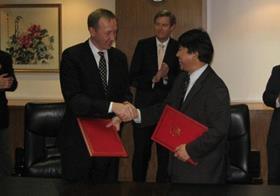
Belgian pear exporters are preparing to send their fruit direct to five mainland ports in China this coming October after successfully establishing an historic import protocol agreement with the authorities in Beijing.
After just three and a half years – record timing in comparison with other similar negotiations – Belgium is now poised to become the first supplier worldwide to export pears to China. Pears are also the first category of Belgian fresh produce to be granted access to the country.
The breakthrough came as a result of coordinated efforts by leading Belgian topfruit supplier Belgische Fruitveiling (BFV), which markets the Truval brand in markets worlwide, as well as Belgium's food safety agency FASFC and its diplomatic representation in China.
The EU agricultural attaché in Beijing and the Chinese Administration for Quality Supervision Inspection and Quarantine (AQSIQ) are also understood to have been involved in putting the agreement into place.
The protocol was signed in Beijing on 18 May by Didier Vanderhasselt, Minister Counsellor and Deputy Chief of Mission at the Belgian embassy in Beijing, and Huang Guansheng, director general of AQSIQ, assisted by Wang Yiyu, director of AQSIQ's biosecurity division.
Also present were Michel Gerebtzoff, agricultural attaché at the Belgian embassy in Beijing, and BFV's Asia manager Marc Evrard, who confirmed that the potential market for Belgian pears in China could be 'considerable'.
'The market will have to be built up gradually, aided by consumer education and promotional events,' he explained. 'Based on experience in the region, the volume might be considerable after an initial phase. It's very difficult to project any figures, but we know from other markets that the turnover on the Chinese market could be considerable.'
In order to meet the terms of the protocol agreement, Belgian pear producers and exporters will have to ensure that certain plant protection measures are taken, such as protecting the fruit from plant pests and establishing certified pest-free zones.
Prior to the start of next season, Chinese quarantine inspectors will carry out an additional inspection to verify existing procedures.
According to Mr Evrard, implementation of such procedures is not expected to present any problems for the Belgian pear industry: 'The protocol to a large extent reflects good agricultural practice,' he confirmed.
Further information about the opening of the Chinese market to Belgian pears will be published in the July/August issue of Asiafruit Magazine.



